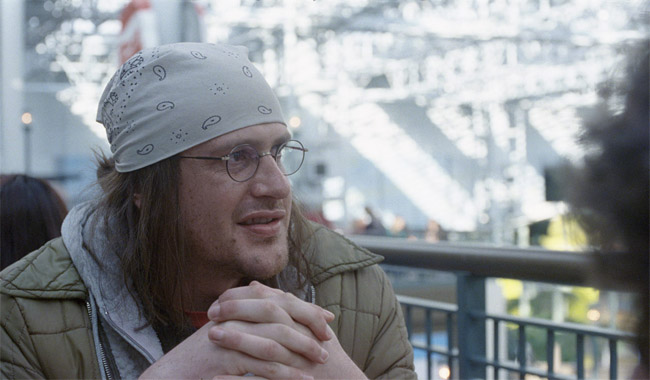
How the Best Commencement Speech of All Time Was Bad for Literature
David Foster Wallace's New Sentimentality Got Old, Fast
Let’s take a moment to remember that David Foster Wallace once wrote an aquatic-themed graduation speech, the same one that your cousin probably forwarded you in your first year out of college. Since 2009, that speech has been available in a book titled This is Water: Some Thoughts, Delivered on a Significant Occasion, on Living a Compassionate Life. The Significant Occasion in question was the 2005 commencement address at Kenyon College, which you used to be able to watch on Youtube. In that original footage, Wallace gave us the full-on Wallace: long-haired, head down, openly concerned about sweating. It was moving to watch, if only because watching anyone labor through a public speaking engagement is moving. Wallace stands at a lectern, somehow wearing and simultaneously not wearing an honorary robe that’s draped across the front of him like a painter’s smock, ostensibly for ventilation. Behind him are graduates on bleachers, wearing awful sunglasses. There is a chair-squeaking, throat-clearing murmur of parental expectation. It is a College Graduation to the core. And it was arguably the most significant moment in Wallace’s literary career.
You have probably read the speech, you have possibly watched it, and you may have even gone so far as to buy it. If you’ve encountered it in any of its afterlives, you might have found something disarming about it, a kind of aw-shucks literary sleight-of-hand that explains how it became a staple of family-forwarded chain mail, if not exactly a novelty book pedaled at $15 a pop (250 words per dollar). But what makes the speech disarming is what made it a brilliant career move—a way of amplifying Wallace’s brainiac celebrity with a sentimentality of Roald Dahl proportions. A way of enlisting the allegiance, even worship, of people who had no reason to open Infinite Jest, a novel as heavy as a phonebook and occasionally as boring. This cynical interpretation of Wallace’s motives is also a statement of commercial fact. The speech is without a doubt the most read, most shared, most fan-videoed, most vexingly adored contribution of Wallace’s small oeuvre. And it begins with characteristic Wallace self-deprecation (and a dorky little preamble):
If anybody feels like perspiring [cough], I’d advise you to go ahead, because I’m sure going to. In fact I’m gonna [mumbles while pulling up his gown and taking out a handkerchief from his pocket]. Greetings [“parents”?] and congratulations to Kenyon’s graduating class of 2005. There are these two young fish swimming along and they happen to meet an older fish swimming the other way, who nods at them and says “Morning, boys. How’s the water?” And the two young fish swim on for a bit, and then eventually one of them looks over at the other and goes “What the hell is water?”
This is definitely tedious, and Wallace’s triumph in This is Water is to let us know that he knows it’s tedious—that this “deployment of didactic little parable-ish stories,” as he says in the next sentence, is the “standard requirement of US commencement speeches.” But he turns the wheel a few more times. He declares that these little parable-ish stories are some of the “better, less bull-shitty conventions of the genre.” And in the next breath assures us, with a deft non-sequitur, that “if you’re worried that I plan to present myself here as the wise, older fish explaining what water is to you younger fish, please don’t be.” In this story and in this speech, he insists, “I am not the wise old fish.”
Writing a commencement speech demands that you say trite things with heartfelt conviction in front of a large crowd of people, some of whom might actually be listening and some of whom are absolutely being paid to record you. However handsomely remunerated, this is a trying assignment for a person who sets professional and personal stake in the things they say and write. The only real non-monetary consolation for such a task is the knowledge that no one in their right mind would ever expect you to produce meaningful thoughts in these conditions, much less publish them in a hardcover book the minute you die.
But here we are. This is Water is often praised as being the best commencement speech of all time. This is plausible. What is less plausible is that the best commencement speech of all time, and so the best entry in a necessarily humiliating category, has been consecrated as actual Wisdom by Wallace’s casual and die-hard readers alike. This is Water is the best commencement speech of all time not because it has transcended the formula, flattery, and platitudes that a graduation speech trades in, but precisely because it has mastered them. Wallace does not conceal this. He tells you what he’s giving you upfront. “Stated as an English sentence,” says Wallace, the moral of his fish-parable “is just a banal platitude, but the fact is that in the day to day trenches of adult existence, banal platitudes can have a life or death importance.”
This is Water is the best commencement speech of all time not because it has transcended the formula, flattery, and platitudes that a graduation speech trades in, but precisely because it has mastered them.
Tell your audiences that they’re too smart to want a certain thing and give it to them anyway. Remind everyone that they’re too hip for corny dad sermonizing and then double down on the corny dad sermonizing. This is a great way to write a commencement speech—not by avoiding platitudes, but by drawing an enchanted circle around yourself where the things we thought were platitudes can be revealed as dazzling truths. Where all of us can be consoled, if only for an instant, by the notion that the insight we lack has been here all along! Just hiding inside of our clichés.
Now, thanks to the recent biopic The End of the Tour, Wallace will be forever conflated in popular consciousness with Jason Segel, the actor famous for playing the hapless mensch from the sitcom How I Met Your Mother (the millennial Friends) and for a full-frontal nude scene of unbearable pathos in the comedy Forgetting Sarah Marshall. Casting Segel as Wallace is like casting Mr. Rodgers as William Faulkner: it will secure his personal legacy as something almost absurdly benign, and in doing so ensure that the Wallace of This is Water, whimsically wearing his graduation robe and pleading for us all to get along, will be the Wallace we all remember. For fans of Wallace’s complex fiction and essays, the Jason-Segeling of Wallace might feel like something of a loss, the final step in appointing an experimental novelist as the patron saint of saccharine. But the truth is that Wallace had appointed himself to that position a long time ago.
 Photo: A24 Films
Photo: A24 Films
There is a calculated magic to Wallace’s commencement speech, and he should be praised for it: it was exactly the literary showmanship demanded of him. But the same magical thinking permeates much of Wallace’s other work, which presumably wasn’t written for stadiums full of 21-year-olds and their unsullied dreams. This is Water offers a note-perfect coda to “E Pluribus Unum,” the signal document of a trend in contemporary literature often referred to as the New Sincerity. In Wallace’s literary practice, the New Sincerity amounts to a framework of literary value that attaches a moral premium to platitudes. That insists, with a deadly earnestness, that “platitudes can have a life or death importance.” So much of Wallace’s writing, whether its critically carpet-bombing John Updike or standing bashfully at a lectern at Kenyon College, has shared in this conviction: that to be sincere is to be banal; and that banality is truth.
* * * *
In 2005, David Foster Wallace stood at a lectern at an elite liberal arts college and explained that the “real value of a real education has nothing to do with knowledge” and everything to do with “simple awareness.” In 2016, the real value of my education is rapidly accumulating interest that no amount of simple awareness is likely to likely to pay off, and I never want to see This Is Water on my newsfeed again. I’m tired of the high cultural premium on sincerity, which has sky rocketed this election cycle. If sincerity is a virtue, its one I’ve never had or wanted, and one that would do me little good anyway. Praising a person for their sincerity too often means praising a person for having feelings, and feelings, for some reason, seem to count less when women have them. It’s hard not to notice that the New Sincerity authors—Franzen, Wallace, Safran Foer—are men; everyone has noticed that David Foster Wallace die-hards are disproportionately men; and the only people who have ever recommended I read This Is Water for the billionth time have all been men. Maybe, as every Wallace critic has fastidiously maintained, the fiction isn’t guilty of the sins of its fandom. The fiction may not be, but in Wallace’s case, the non-fiction often is.
In 2016, the real value of my education is rapidly accumulating interest that no amount of simple awareness is likely to likely to pay off, and I never want to see This Is Water on my newsfeed again.
Sincerity furnishes the popular legacy of Wallace, along with footnotes, bandanas, and “This is Water.” And, like This is Water, it’s the worst thing he’s ever inflicted on us. We’re still crawling out from under it. Every time graduation season rolls around, so does This Is Water, and a renewed enthusiasm for fish parables, Wallace hagiography, and soggy sincerity.
That sincerity has always enfolded an impotent politics. In the speech’s most memorable passage, one exercises their “choice of what not to think” in the supermarket by choosing, despite the tedium and frustration of “adult existence,” to think patient, hospitable thoughts about the other customers:
But most days, if you’re aware enough to give yourself a choice, you can choose to look differently at this fat, dead-eyed, over-made-up lady who just screamed at her kid in the checkout line. Maybe she’s not usually like this. Maybe she’s been up three straight nights holding the hand of a husband who is dying of bone cancer. Or maybe this very lady is the low-wage clerk at the motor vehicle department, who just yesterday helped your spouse resolve a horrific, infuriating, red-tape problem through some small act of bureaucratic kindness. Of course, none of this is likely, but it’s also not impossible. It just depends on what you want to consider.
Wallace’s message seems to be: it’s nice to think nice thoughts about people. This is a cheerful tautology and happy, undamaging advice. It is also a remarkably empty account of the ethical challenges and obligations of adult life. The nice thoughts that we think about people are worth nothing to anyone unless they are meaningfully voiced in the public sphere, unless they’re given an active civic expression. But in Wallace’s vision, one’s obligation to other people begins and ends in the privacy of one’s own mind. Which is just to say that one has no actual obligation to other people at all.
But that’s how the cult of sincerity works: by promoting feelings in lieu of civic commitment. In “E Pluribus Unum,” Wallace suggests sincerity as the shibboleth of a new “rebel” artist class:
The next real literary “rebels” in this country might well emerge as some weird bunch of anti-rebels, born oglers who dare somehow to back away from ironic watching, who have the childish gall actually to endorse and instantiate single-entendre principles. Who treat of plain old untrendy human troubles and emotions in U.S. life with reverence and conviction. Who eschew self-consciousness and hip fatigue. These anti-rebels would be outdated, of course, before they even started. Dead on the page. Too sincere. Clearly repressed. Backward, quaint, naive, anachronistic. Maybe that’ll be the point. Maybe that’s why they’ll be the next real rebels. Real rebels, as far as I can see, risk disapproval. The old postmodern insurgents risked the gasp and squeal: shock, disgust, outrage, censorship, accusations of socialism, anarchism, nihilism. Today’s risks are different. The new rebels might be artists willing to risk the yawn, the rolled eyes, the cool smile, the nudged ribs, the parody of gifted ironists, the “Oh how banal.”
Wallace’s idea of a literary rebel risks nothing except ridicule, another way of saying a rebel who risks nothing at all. Rebels who brave snide hipster foes to protect what’s “backward, “unhip”, “banal.” Rebels who wage their mighty non-rebellion in the service of “single-entendre principles.” By this account, I, too, am a literary rebel, sitting here on my single-entendre couch. We can all be rebels, provided we live our Truth, and that Truth is a fierce loyalty to platitudes, “backward” cultural values, and sincerity for sincerity’s sake.
Sincerity has always been the rationale for praising smug superficialities and cheap feeling. For believing that convictions are laudable just by virtue of being convictions, regardless of their content. If we just really feel our feelings and really think our thoughts, the logic goes, somehow we’ll save ourselves and our culture. This is bleeding-heart basis of This Is Water, with its barren social vision and earnest defense of platitudes. Maybe the dangers of irony, as Wallace once said, was that we all become horrible post-modern cretins, “oglers” and “lurkers” hiding behind our puns and our snark and our profound suspicion of every empty piety. I would take those cretins any day over smart men who congratulate themselves for their sincerity.
Sincerity has always been the rationale for praising smug superficialities and cheap feeling.
There is, moreover, a blind arrogance in the belief that what you primarily owe the world is your sincerity: the gift of your outspoken, unmediated self, your willingness to be the most you that you can be. It’s a belief in which simply existing becomes an act of bravery—which in a private, harrowing way, it was for Wallace. We know that now. But the truth remains that for most people like him—white, male, preternaturally talented—being in the world is not a matter of moral courage. To be male, gifted and white is to be as safe on Earth as any mortal can expect to be, to live in the ambivalent knowledge that the greatest violence you’re likely to encounter is the violence that you do to yourself.
Irony has nearly died this election cycle, with Donald Trump turning the sincerity fetish into orange-haired flesh, disabling irony by embodying satire. He has made sexism, racism, and Mussolini quotations brave simply by making them sincere. Donald Trump speaks truth to power—“power” in this case being women, immigrants, and “the establishment”—and sincerity suddenly becomes the bounced check that might buy the entire country. None of this is David Foster Wallace’s fault, of course, but it might be sincerity’s. Wallace was a writer of beautiful and devastating sentences, a writer whose sound-bites on literature—“it’s about being a fucking human being!”—have received more cultural airplay than virtually any others. But I don’t know what literature is about. I’m not sure that it’s about what it feels like to be a human being. I’m not sure that it makes us kinder, more empathetic, more humane. But I do believe that literature ends where sincere platitudes begin, and that we should expect more of our literary rebels than the inside of a Hallmark card.
Emily Harnett
Emily Harnett is Philadelphia-based writer on contemporary fiction and pop culture. Her other writing can be found at Broadly and Jacket2.



















